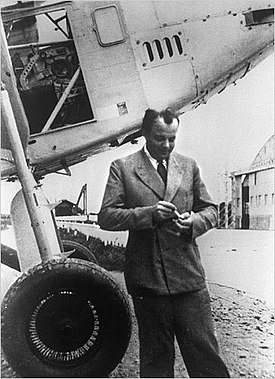Antoine de Saint-Exupéry
| Antoine de Saint-Exupéry | |
|---|---|

Saint-Exupéry in Toulouse, France, 1933
|
|
| Born | Antoine Marie Jean-Baptiste Roger 29 June 1900 Lyon, France |
| Died | presumed 31 July 1944 (aged 44) unknown (perhaps offshore, south of Marseille, France) |
| Occupation | Aviator, writer |
| Nationality | French |
| Education | Villa St. Jean International School |
| Period | 1929–44 1944–2008 (posthumous) |
| Genre | Autobiography, belles-lettres, essays, children's literature |
| Notable awards |
Légion d'honneur (1929) Croix de guerre avec palme (posthumous) |
| Spouse | Consuelo Suncín de Sandova (1931 – his death) |
|
|
|
| Signature | |
Légion d'honneur (1929)
prix Femina (1929)
Grand Prix du roman de l'Académie française (1939)
U.S. National Book Award (1940)
Croix de guerre (1940)
Antoine Marie Jean-Baptiste Roger, comte de Saint-Exupéry (French: [ɑ̃twan də sɛ̃tɛɡzypeʁi]; 29 June 1900 – 31 July 1944) was a French writer, poet, aristocrat, journalist, and pioneering aviator. He became a laureate of several of France's highest literary awards and also won the U.S. National Book Award. He is best remembered for his novella The Little Prince (Le Petit Prince) and for his lyrical aviation writings, including Wind, Sand and Stars and Night Flight.
Saint-Exupéry was a successful commercial pilot before World War II, working airmail routes in Europe, Africa and South America. At the outbreak of war, he joined the French Air Force (Armée de l'Air), flying reconnaissance missions until France's armistice with Germany in 1940. After being demobilised from the French Air Force, he travelled to the United States to persuade its government to enter the war against Nazi Germany. Following a 27-month hiatus in North America, during which he wrote three of his most important works, he joined the Free French Air Force in North Africa, although he was far past the maximum age for such pilots and in declining health. He disappeared over the Mediterranean on a reconnaissance mission in July 1944, and is believed to have died at that time.
...
Wikipedia
